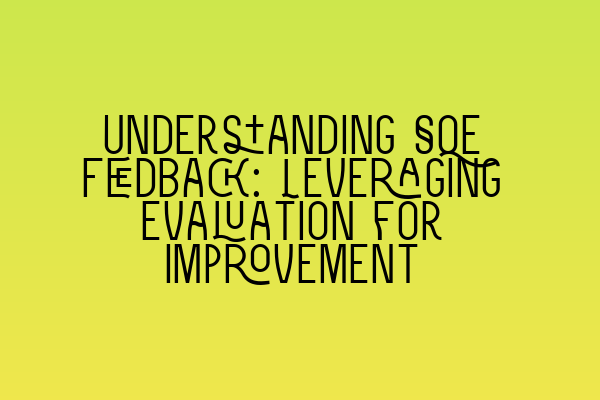Understanding SQE Feedback: Leveraging Evaluation for Improvement
Introduction
As a solicitor, receiving feedback on your SQE (Solicitors Qualifying Examination) performance is crucial for your professional development. Constructive feedback not only helps you identify areas of improvement but also enables you to enhance your skills and knowledge as you navigate the legal profession. In this blog post, we will delve into the significance of understanding SQE feedback and provide you with insights on how to leverage evaluation for improvement.
1. The Importance of SQE Feedback
Receiving feedback on your SQE performance is an invaluable opportunity to gauge your competency and progress as a solicitor. By understanding the areas where you excel and those needing improvement, you can focus your efforts on enhancing your legal proficiency. SQE feedback serves as a powerful tool for self-reflection and growth, allowing you to identify your strengths, weaknesses, and areas where you can further develop your knowledge and expertise.
2. Leveraging Evaluation for Improvement
To harness the full potential of SQE feedback, it is essential to adopt a strategic approach. Here are some effective ways to leverage evaluation for improvement:
a. Thoroughly Review Feedback: Take the time to carefully read and analyze the feedback you receive. Identify the key areas that require attention and understand the specific suggestions given by the evaluators. By delving deep into the feedback, you can gain valuable insights into how to enhance your legal skills.
b. Seek Clarification: If there are any aspects of the feedback that you find unclear or need further explanation, don’t hesitate to reach out to the evaluators or mentors for clarification. Understanding the feedback fully ensures that you can address the identified areas of improvement effectively.
c. Create a Development Plan: Based on the feedback received, create a comprehensive development plan. This plan should outline specific actions and steps you will take to strengthen your knowledge and skills in the areas highlighted in the evaluation. By setting clear goals and creating a roadmap, you can track your progress and work towards improvement.
d. Utilize Additional Resources: Enhance your understanding of the areas of improvement by exploring additional resources related to the topics highlighted in the feedback. For example, you can read articles such as “Joint Ownership: Legal Considerations for Co-Owners of Property,” “Commercial Leases: Essential Insights for Business Premises,” “Tenant Rights in the UK: Understanding Your Legal Protections,” “Property Transactions and the Legal Process: A Comprehensive Guide,” and “Examining the Intricacies of Land Law in the UK” to gain a deeper understanding of specific legal concepts.
e. Seek Mentorship and Guidance: Reach out to experienced solicitors and mentors who can provide valuable guidance and support as you work towards improvement. Their insights and expertise can offer a fresh perspective, helping you further refine your skills.
f. Practice, Practice, Practice: Put your knowledge into action through practice. Engage in practical exercises, mock exams, or participate in legal clinics to strengthen the areas identified for improvement. By continuously applying what you learn, you can refine your skills and build confidence in your legal abilities.
Conclusion
SQE feedback is a powerful tool for solicitors to enhance their legal knowledge and skills. By understanding the feedback received, creating a development plan, utilizing additional resources, seeking mentorship, and engaging in regular practice, you can leverage evaluation for improvement and excel in your legal profession. Embrace feedback as an opportunity for growth, and always strive to refine your skills and stay at the forefront of the legal field.

Leave a Reply